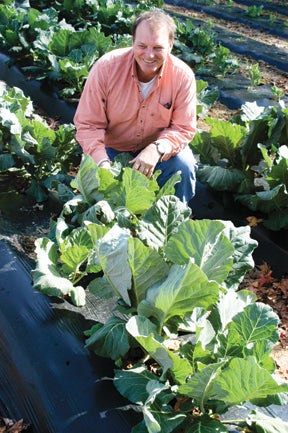FDES students dig into ag project
Published 11:20 am Thursday, December 15, 2011

Harold McLemore shows off the greens raised by third grade students at Fort Deposit Elementary as part of a state Department of Agriculture grant funded project.
By Fred Guarino
The Lowndes Signal
Third graders at Fort Deposit Elementary got to literally reap what they sowed last Thursday.
Third grade students participated in a state Department of Agriculture project to plant and harvest collard greens, and to eat those greens in their own school cafeteria.
Working with the students was Harold McLemore, who works with the state Agriculture Department, the Mid-South Resource Conservation & Development Council Inc., the Small Farmers Committee and the Tuskegee University Extension Program.
William Hodge and Jackie Thomas from Mid-South RC&D, George Hunter, extension agent for Wilcox and Lowndes counties and Millicent Braxton, an extension educator for Wilcox and Lowndes County, were all on hand as the children in all grades at Fort Deposit went to lunch and were treated to the collard greens the third grade raised as part of a balanced meal.
McLemore said the students helped with what is called a plastic culture project this past September.
He said after the planting, the youngsters were asked to, “Show me your dirty hands for all the work they did.”
He explained that the students watched the greens grow in “plastic culture,” a technique of farming that raises the garden bed six inches high and divides it into 30-inch wide strips.
“You put drip tape right down the middle of the bed, cover it with black plastic, punch holes in it and put the plants in,” said McLemore.
He explained that “drip tape” is like a souped up soaker hose that is really precise as to how much water is provided.
“What we tried to do was find a nutritional project and a fun farm program,” McLemore said. He said the children learned the horticulture aspects of farming, participated in a physical activity and enjoyed “a nutritious meal with the collard greens they planted and grew.”
Hunter agreed saying, “I think it is an excellent link between the young kids learning a three part situation, teaching them about consumption of fresh vegetables.”
He said, “I think it gives them a real good sharp incite to be involved with people like Harold/the University of Tuskegee… watching the plants grow from garden all the way to the table.”
He also said it linked physical activity with healthy eating. “I think that projects like this are very important to equip these kids with the extra information that they need not only to enter life skilled but to be more physical and fit and at the same time maybe increase and enhance their life and their food intake.”




